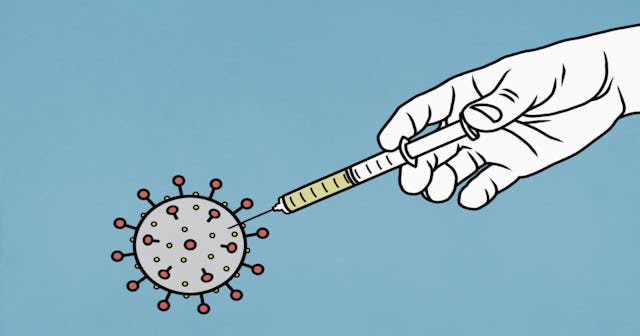What The Experts Are Saying About The COVID-19 Vaccine From Pfizer

Nearly eight months after the World Health Organization declared COVID-19 a global pandemic, the breaking news alert I’d been waiting for pinged on my phone: Pfizer and BioNTech had a vaccine candidate that was found to be more than 90% effective in preventing COVID-19 in participants.
Vaccine! 90%! Preventing!
To be honest, that was all enough for me at first. I was so deliriously happy I couldn’t see straight to continue reading beyond that. But then I remembered, it’s 2020, and maybe this is too good to be true.
Luckily, a number of health care experts and scientists weighed in, and their conclusion, crafted after careful thought and contemplation, was the same as mine: this is good news for a number of reasons—with a few doses of reality.
The underlying triumph of this news is subtle, yet crucial: we now know vaccines will work to prevent COVID.
Before Pfizer and BioNTech’s big announcement, researchers knew they could help the body create antibodies, but they did not know whether those antibodies would prevent disease, according to Andy Slavitt, former Obama health care head, who took to Twitter to explain what Pfizer and BioNTech’s vaccine news meant. The effectiveness of this vaccine in trial proves that the antibodies can prevent disease, and that perhaps, “the virus is lethal because it’s novel, not because it’s complicated,” according to Slavitt.
Pfizer and BioNtech’s news is good news for all the vaccine candidates.
The fact that the virus and the spike protein may not be as complicated as initially believed is good news for vaccine candidates coming from Moderna, Johnson & Johnson, and AstraZeneca.
Many of the vaccine candidates currently in trial are focusing on the spike protein that Pfizer has tested and found successful. As a result, there’s reason to believe that “if the spike protein prompts a strong protection to the coronavirus, then all of these vaccines might also deliver encouraging results in the months to come,” according to the New York Times.
In that same Times article, Akiko Iwasaki of Yale University, said Pfizer’s encouraging results give “us more hope that other vaccines are going to be effective too.”
The more successful vaccine candidates we have to distribute, the better.
Even with a successful vaccine, there are logistical problems to overcome. The number one hurdle is inventory. Pfizer’s chief executive has suggested that about 15 to 20 million people could get both doses of the vaccine by the end of this year and up to 1.3 billion doses next year. That still doesn’t quite meet the world’s need. More vaccines would help meet that demand.
Aside from just the sheer number of vaccines we need to protect enough people to end this public health crisis, Pfizer’s vaccine requires two doses, given three weeks apart. It also must be stored in a cold storage box at -75 degrees, according to Slavitt. This all may pose a logistical problem.
In a Twitter thread, Katy Stephenson, MD, Assistant Professor at Harvard Medical School, and Director of the Clinical Trials Unit Center for Virology & Vaccine Research at Beth Israel Deaconess Medical Center notes that, “This vaccine is delicate to ship and store and will be logistically challenging to distribute in resource poor settings. We will need other products for these areas.”
Which means the more vaccines available the better.
Pfizer has reported no serious safety concerns from the vaccine, but emergency approval won’t come for another few weeks.
According to Stephenson, the vaccine won’t be up for emergency use approval until two months of safety data has been collected, as required by the FDA. Then, the FDA consults with an outside advisory committee made of experts who review data about safety, effectiveness, and manufacturing.
There’s a chance the vaccine could be available for certain high risk populations by the end of the year, but that would require all the parts to move efficiently and with no surprises.
Ultimately, it’s important to keep in mind that clinical trials cannot tell us with exact certainty how effective the vaccine will be in the general population. That’s only possible to know once millions of people have received the vaccine, but the “preliminary data leads experts to believe that the effectiveness will be very high.”
Regardless of how effective the vaccine is, it will be “useless if no one uses it,” says Stephenson.
There’s a decent amount of mistrust surrounding the vaccine and that needs to be broken down to encourage folks to take the vaccine once it’s available. Slavitt notes that “If the numbers are right, we need 60% compliance instead of the 80-90% we thought to get to herd immunity.” But that still means the majority of people must be vaccinated before the virus begins to disappear from our communities.
Like always with COVID, every new answer ushers in a series of new questions.
We know the vaccine is 90% effective, and we know there are no big safety concerns. In the big picture, those are the two most important takeaways. However, with those answers, come more questions.
Slavitt notes that, we don’t yet know how this vaccine will affect children, pregnant women, or adults older than 85 years old. He notes further that we don’t know how long immunity will last, whether it works on severe and mild or just mild cases, and whether you are still contagious if you are vaccinated.”
Stephenson notes that, “We do not know if this data applies to people who already had antibodies to COVID-19 because they were infected months before.”
There are still many unknowns. We all still have to listen to health care experts and make sure we all social distance, wear masks, and wash our hands to protect ourselves and our communities. But overall, Pfizer and BioNTech’s announcement is good news. There is a light at the end of the tunnel. There is hope in a year that has often felt utterly hopeless.